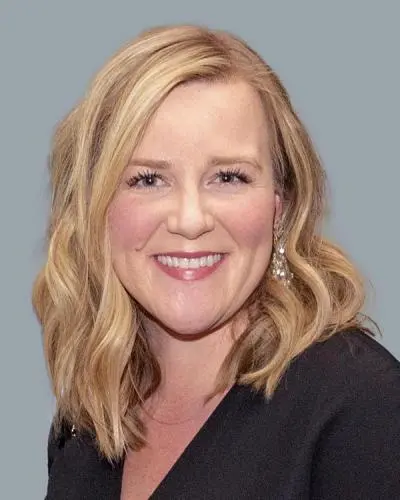Visit the website of Delmarva Veteran Builders, and “contractor” doesn’t necessarily jump off the page. In place of project photos and heavy equipment b-roll is an illustration of a stoic young man wearing a military uniform on one side of his body and a DVB-branded polo shirt and hard hat on the other. Scroll down a bit farther and you see a slideshow of World War II–inspired marketing posters featuring DVB team members, and beyond that, a video focused on—you guessed it—more DVB employees.
So, where are all the projects?
“From day one, we’ve always been a very people-focused company,” says DVB founder and president Chris Eccleston. “We believe that’s really what our customer is buying, right? They’re buying the people to execute their project. The fact that our entire marketing strategy is focused on our people—that’s all by design.”
That’s not to say anything is lacking in the company’s portfolio. DVB primarily does commercial work, for notable clients that have included Perdue Chicken and Hilton Hotels, and brings in annual revenues of about $25 million. Perhaps even more impressively, in 2018—just five years after its founding—DVB ranked in the top 10% (#456) on Inc. magazine’s list of the 5,000 fastest-growing companies in the United States. What’s the secret to such fast-moving success? “I knew the veteran mindset, the attitude of the folks in the military I operated with and other veterans I knew,” Eccleston says. “And I just kind of knew that we could bring this level of intensity and service-mindedness to our marketplace, and we could win doing that.”
Today, DVB draws on four core values to bring that winning mentality to market: have grit, be fresh, ignite potential and do epic things. Here’s a look at how those values have set up the company for success, ensured its continued growth and helped Eccleston and his team get creative about ensuring a promising future for the construction industry.
BACK TO SCHOOL
On Sept. 11, 2001, terror and tragedy struck the nation when two planes flew into the World Trade Center in New York City, followed by a third plane crashing into the Pentagon in Arlington, Virginia, and a fourth hijacking attempt headed for the U.S. Capitol that was thwarted by the passengers of Flight 93, who forced the plane down in a Pennsylvania field in order to minimize casualties. A week later, Eccleston, then an active-duty sailor in the U.S. Navy, was on board the aircraft carrier U.S.S. Theodore Roosevelt, bound for Afghanistan as part of Operation Enduring Freedom.
“The flag that the firefighters rose at Ground Zero that day [Sept. 11]—they flew that flag out to our ship,” Eccleston says, “and we flew it every night when we ran missions.”
As a nuclear machinist mate, Eccleston was responsible for maintaining the carrier’s nuclear power system. “Did you ever see the series ‘Chernobyl’?” he asks CE in an interview. “It was that kind of stuff, minus the big explosion. So, big pumps, big valves, big turbines, all of that. But once you turn it on, it’s just monotonous.”
Citing his need for “a lot of change” and “tangibility,” Eccleston left the Navy in 2006 after three successful tours; back home in Salisbury, Maryland, he felt himself pulled toward construction. “I promised myself I was going to go to college and get my degree,” he says, “and I actually wanted to be an engineer, and then I found out I had to take four years of calculus. I remember talking to my adviser, and they said, ‘Well, you know, we have a construction management program where you can take one year of calculus’—and I said, ‘Well, that’s what I’m doing then.’”
He started at Old Dominion University, then moved to the University of Maryland, Eastern Shore. Being an older college student—he was 25 when he started the program—Eccleston recalls all of his friends getting “big-boy jobs” and going on extravagant vacations he couldn’t afford. “I was going to college full-time, and I was making $10 an hour working as a laborer on construction sites. I just couldn’t do it.” He pushed through, and by the last year of college, he’d worked his way up to a project-manager with Gillis Gilkerson, running four construction jobs for the Salisbury-based contractor over the course of his senior year.
After graduating in 2008, he was tasked with forming a new division of the company, but through the long hours and hard work, he couldn’t shake the feeling that he could venture out on his own and do things better. And, suddenly, it was five years later, and time to launch DVB. “I had a lot of relationships at that point; I was pretty involved in the community, so I knew a lot of people,” Eccleston says. “And we were starting to come out of the recession, so that’s probably just the dumb-luck aspect of it, but I decided to go for it.”
THE WAR AT HOME
Right out of the gate, Eccleston made hiring veterans a priority, believing the training they received and the discipline and team mentality they developed during service made them ideal candidates for construction careers. In 2013, he says, “the wars were winding down, and all these veterans were coming home and having trouble finding work. I remember calling one guy who had just gotten back from Army deployment, and he was like, ‘I don’t know anything about construction.’ And I said, ‘That’s fine, I can teach you that.’
“And that was the mindset that really started to build our company and help us grow,” Eccleston says. “We felt if we found character and capability and competence, we could teach construction. That’s where we’re probably a little bit different. We were a new company, so I didn’t have the resources to go out and hire these experienced superintendents. But I had good people who I knew I could train up, and I put my faith in them, and they put theirs in me, and it clicked.”
Throughout DVB’s 10-year existence, at least 50% of its workforce has been made up of veterans—a figure the company maintains by attracting military talent with benefits like paid leave for reservist drill and extensive involvement in supporting veteran causes. Marine Corps vet Danny Diaz-Ortega, now an Air Force reservist and the subject of that DVB homepage illustration, counts himself lucky that Eccleston took a chance on him. “I was a pipelayer in D.C. for three years before I got hired at Delmarva Veteran Builders in 2016,” Diaz-Ortega says. “I had just moved to Salisbury to take classes at Salisbury University, and I was so broke. The only income I had at the time was the $200 stipend I would get from doing weekend drill in the reserves.”
After an unsuccessful search for a construction job, he took a position in the restaurant industry in nearby Ocean City, Maryland, but was less than thrilled with the odd hours he had to work while trying to earn a degree. “I remember one day driving on my way to a restaurant shift, and I was just thinking something had to give,” Diaz-Ortega says. “And this truck drove past me that said, ‘Delmarva Veteran Builders.’ So I googled it, and it said their mission was trying to give veterans an opportunity as they got out of the military, and I thought ‘Whoa, they’re speaking my language here.’” He called DVB and talked to Eccleston, who referred him to Operations Manager Daniel Mills, who asked him to come in for an interview that afternoon. Diaz-Ortega’s energy, experience and shirt and tie made the right impression, and DVB offered him a job starting the next morning.
Seven-and-a-half years later, Diaz-Ortega is still with the company, now as a project manager. “I’d been with DVB for about a year-and-a-half,” he says, “and one day Daniel and Chris came to me and said, ‘Hey, would you want to give project management a try?’ I was still in college at the time, and I wanted to do medical research when I got out, so I was hesitant, but they convinced me to try one job.”
Mills and Eccleston put Diaz-Ortega in charge of a $170,000 project, and by the time he was finished, he was hooked. “I had a ball doing it, because it was so fast-paced,” Diaz-Ortega says. “There are a lot of moving parts and you’re dealing with a lot of things and you’re making a lot of things work, and it just hit me like a ton of bricks that I just wanted to graduate so I could keep working with this company. Now I’ve been here for three-quarters of the company’s existence and have been part of all of these big milestones, and it’s just a really cool experience to be a part of.”
FAMILY FIRST
“A really cool experience to be a part of” seems to be the way most DVB employees view their employer. Just ask Kathryn Ellis, vice president and minority owner of DVB, who met Eccleston when they worked on a few projects together during her original career in architecture and interior design. “One of the main reasons that I took the leap of faith and came over to DVB [as a project manager] seven years ago was that I wanted to start having a family,” Ellis says. “And where I was in my architecture career, I felt that my career might be affected a little. DVB is huge on ‘family comes first.’ Most of us are young, and we have young families, and we all believe that it’s extremely important that you’re with them.”
The company is committed to the idea that a happy, healthy home transfers to the workplace. Beyond ensuring that employees have the flexibility to be present at home, DVB brings its employees’ families into the fold, hosting company picnics and holiday parties that include them.
“A lot of times I think at work people just feel like they have their boss, and it’s a dictatorship, and you have to just do what you’re told,” Diaz-Ortega says. “At DVB, we really strive to work together as a team and get the maximum amount of work done in an eight-hour day, and then we’re all going home to our families.”
Ask around, and you’ll hear that that kind of environment can be hard to find in the construction industry. “With the older generation, sometimes they just don’t believe it when we tell them how flexible we are, because they’ve worked at places where that’s not at all the case,” Ellis says. “I’ll write out offers, and I literally have to write out exactly what they’re going to get from us [in terms of flexibility], so that they feel comfortable. We’re working really hard to change the perception that a career in construction can’t offer the work-life balance so many people are looking for.”
WRITING IT DOWN
Investing in its current workforce through great benefits and a positive, family-friendly work environment is helping shore up DVB’s success for now, but the harsh, industry-wide reality is that construction is facing a huge skilled-worker shortage. On top of that, 20% of the current workforce is expected to retire in the next 10 years. “We’re down to really just one or two masonry companies in our area that are capable of doing the size projects we’re looking for,” Eccleston says. “We’ve now reached a point where we have architects redesigning some buildings or changing the way we build things here, because we just simply don’t have those craftspeople in our market to do the work.”
Eccleston and his team believe that the key to solving that problem lies in spreading the word about construction-career opportunities as early as possible. They’ve taken a novel approach (literally): writing a children’s book called “Grit Leads to Greatness,” which follows the story of two young kids on a mission to save their crumbling society by learning trade skills that help them rebuild it. (See “This One’s for the Kids,” p. 29.) “We know we have to change the way we get people interested in the industry, so we decided to take matters into our own hands,” says Jenny Schroen, DVB’s creative developer and Eccleston’s “Grit Leads to Greatness” co-author. “We initially created this book as a leave-behind at some local school projects we’d been working on, and we’ve been so pleased with how it’s been received.
“We’ve had DVB employees going to classrooms when we finish projects and reading the book to students, and it’s been amazing to really see the kids get excited about the trades,” Schroen says. “And, really, it’s been equally as exciting to see our trade workers get the thrill of these kids being so interested in what they do, too. It’s really broken down barriers and given them a chance to feel appreciated for their work, and that’s been a huge win that we didn’t necessarily anticipate.”
“Our goal is really to get contractors in the classroom,” Eccleston says. “We want people who are passionate about this industry to get out there and spread the word about all this industry has to offer. The sense of pride we’ve seen in our staff has been amazing. They’re energized. They feel really good about our organization and what we do, and they’re making a difference, and they’re seeing that firsthand. And that’s really what we wanted to create: an experience and a moment in time around the trades and the construction industry. And we believe that if we do that enough times, even if these kids don’t join the trades, they’re going to think of our industry differently and ensure a bright future for the trades.”








